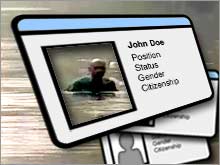 |
| Officials say Hurricanes Rita and Katrina have spawned a new wave of ID theft. |
|
|
|
|
|
|
|
NEW YORK (CNN/Money) -
Hurricane victims struggling to rebuild their lives may be faced with an additional challenge: regaining their identity.
Hurricanes Katrina and Rita left fraudsters with a unique opportunity to prey on unsuspecting victims. With unknown numbers of credit card receipts, bank records, Social Security numbers and other personal information floating in the flood waters, law enforcement officials say they've already seen an increase in identity theft scams.
"We received 17 complaints just last week," said Kris Wartelle, spokeswoman for the Louisiana State Attorney General's office. "People went to seek FEMA aid or get food stamps and found that their Social Security cards had already been used to get that aid."
Additionally, the AG's office reported last week that two men posing as Salvation Army volunteers had been arrested for obtaining personal information from thousands of Louisiana police officers by convincing them that they were eligible for debit vouchers worth $5,000 each.
"We fear that the motivation was identity theft but we're hoping that we stopped it in time," Wartelle said, adding that the AG's office is bracing itself for more complaints in the weeks ahead.
Part of the problem is the willingness among aid officials and citizens to accept that a person is a legitimate victim of the hurricane without proper proof, said Naomi Lefkovitz, staff attorney at the Federal Trade Commission.
"Agencies want to help people and get them on their feet as fast as possible," she said. "There will undoubtedly be some (identity thieves) that fall through the cracks."
She said the FTC is working with the Justice Department and U.S. Postal Service through a task force to identify and prosecute identity thieves.
But identity theft was a difficult problem to solve even before the chaos of the two storms. And now with thousands of citizens roaming the land without proper documentation and identification, the task is even more daunting.
While combating ID theft is always difficult, there are steps you can take to protect against fraud.
Tap your credit report
Under the Fair and Accurate Credit Transactions Act, you can obtain one annual free copy of your credit report. Privacy experts advise displaced victims of hurricane Katrina or Rita to immediately contact one of the three credit bureaus -- Experian, Equifax and TransUnion -- and request a copy.
If someone has been using your private information to open up credit cards or other accounts, it will show up on your report and you can file a fraud alert, said Chris Hoofnagle, senior counsel with the Electronic Privacy Information Center, a Washington research group focusing on privacy and technology.
Once a fraud alert has been activated, you will be contacted if someone applies for credit in your name.
For more information visit www.annualcreditreport.com or call 877-322-8228.
Apply for a change of address
If you've lost your home entirely or have been moved even temporarily, it's a good idea to change your mailing address with the Postal Service, said Robert Weiss, partner at the Chicago-based law firm of Neal Gerber Eisenberg, specializing in information technology law.
The U.S. Post office will be holding mail bound for affected areas in a secure facility until individuals provide a change of address form. But it's a good idea to obtain your mail as soon as possible, especially if you have little documentation to prove who you are.
Contact your financial institutions
While you're changing your address with the post office, it's also good idea to contact your bank and any credit card companies that you have an account with and provide them with your new contact information, Weiss added.
He advised consumers to stop payment on any checks that have the previous address printed on them and order new check books to prevent anyone from accessing your bank account.
Request alternate information
Businesses and officials handing out financial aid to victims may also want to protect themselves from getting duped.
Robert Siciliano, chief executive of IDTheftSecurity.com, a firm that advises corporations on privacy issues, said those claiming to be hurricane victims without proper documentation should be asked to provide information that wouldn't be readily known by an identity thief, such as a mother's maiden name, or better yet, a prior address.
And if a claimant can provide a family member or other acquaintance with proper identification to vouch for them, that would be even better, he added. "Ultimately there has to be accountability and somebody has to be properly identified for that (aid) money to go somewhere," Siciliano said.
File a police report
If you are the victim of identity fraud, be sure to file a police report immediately as well as a complaint with the FTC, experts said.
It's the prerequisite to resolving any fraudulent claims.
-----------------------------------------------------------------
For more about Katrina-related scams, click here.

|